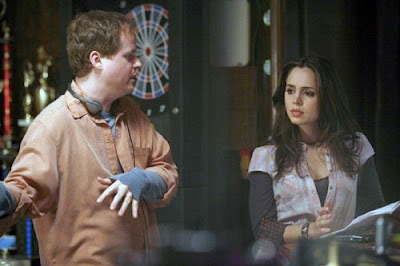This is a response to a rhetorical question Mark posed in an earlier post.
Why am I friends with Charlotte [Mecham] Adsero? Or to reword it in a more universal fashion: why am I Facebook "friends" with [person X] who I never talk to and most likely will never talk to again?
It is a legitimate question. One that I have thought about before. Not necessarily about Charlotte, but she is a good example.
I liked Charlotte back in high school, but we haven't spoken since and I don't think I could honestly tell you a single thing about her. The only thing I remember about her from our time at West High is the quality of her smile.
But we live in a curious age and here I am "friends" with her even though I don't think we would talk at a 10 year reunion that neither one of us is probably going to attend anyway.
Obviously, we don't need to be held to Facebook's semantics. "Friend" made more sense five years ago when Facebook was limited to college campuses. Now it is just a vestigial term that politely encompasses everything from actual family member to that stranger who wants to be friends with everybody sharing the same surname. It flattens the depth and complexity of social relationships, which I believe is why many people bristle at its usage.
Why not just apply Ockham's razor and prune all of these strange people invading my mental space with their incessant tweets? Do I really need to see Mike Spendlove express his skepticism of global warming?
As I was pondering this very un-important question, I thought of a book called The Big Sort. I haven't read the book, but like so many books I haven't read, I feel like I understand the basic premise: that we as Americans tend to move into communities with like-minded Americans. There is little accident that I ended up in communist Portland.
One of the consequences of this Big Sort is that we don't interact with people who disagree with our values, which it turn makes it easier to stereotype and vilify.
For example, on April 15th, people [okay, Fox News] held Tea Parties to protest the Obama administration. As I looked at photos from the various events, I had a hard time empathizing with the protesters and I wondered to myself if I would even be able to engage in a civil dialogue with them. Where did these people come from?
Then again, one of "friends" commented that tax day was a good day to remember John Galt, the hero of Ayn Rand's
Atlas Shrugged.
This friend was John, my ex-girlfriend's ex-step father. We have about as remote of a relationship as can possibly be described under the definition of friendship. And his political views are completely antithetical to my own. Occasionally I think about taking him off my list of "friends."
But I find our friendship as a useful reminder that as much as I would like to envision all libertarians as evil or misguided [which most of them probably are], some of them are like John: extraordinarily nice and exceptionally intelligent. And even though we might disagree about most political issues, I would like to think we would at least be able to discuss them civilly.
Which is not to say that we will be digital friends forever. John may be one of the victims of the massive Facebook friendship culling of 2010.
But I think that is enough of a reason for now.








 Shame on you, Ben.
Shame on you, Ben.








